Saddam Hussein hanged: is Iraq a better place? A safer place? Gaddafi murdered in front of the viewers: is Libya a better place? Now we are demonising Assad. Can we try to draw lessons?
— Sergei Lavrov, Russian foreign minister, United Nations, 1 October
Russia was right about Iraq and Libya, and America and Britain were dead wrong. Regime change doesn’t seem to have changed Middle Eastern countries for the better, as Vladimir Putin has been warning for years. His policy is not to support any armed groups ‘that attempt to resolve internal problems through force’ — by which he means rebels, ‘moderate’ or otherwise. In his words, the Kremlin always has ‘a nasty feeling that if such armed groups get support from abroad, the situation can end up deadlocked. We never know the true goals of these “freedom fighters” and we are concerned that the region could descend into chaos.’
Yet after a decade and a half of scolding the West for non-UN-sanctioned military interventions, Putin has now unilaterally committed Russian forces to what the former CIA director General David Petraeus calls the ‘geopolitical Chernobyl’ of Syria. Russia finds itself allied with Syria, Iraq and Iran — a new ‘coalition’ no less, as Syria’s president Bashar al-Assad described it on Iranian state TV last week. How and why did Putin fail to take his own advice about the unintended consequences that breed in middle-eastern quagmires? And most importantly, how has he managed — so far at least — to make Russia’s intervention in Syria into something close to a diplomatic triumph?
Russia’s decisive intervention has left Barack Obama and David Cameron looking weak and confused. When the usually steadfastly patriotic readers of the New York Daily News were asked whether Putin or Obama had ‘the stronger arguments’, 96 per cent said Putin. In Britain even hawks like Sir Max Hastings — no friend of the Kremlin — are arguing that Russia can help beat Isis. And most importantly, Putin stole the show at the United Nations General Assembly last month with an impassioned speech denouncing the whole US-backed project of democracy in the Middle East at its very root.
The Arab Spring has been a catastrophe, Putin argued, and the western countries who encouraged Arab democrats to rise against their corrupt old rulers opened a Pandora’s box of troubles. ‘Instead of the triumph of democracy and progress, we got violence, poverty and social disaster,’ he told assembled delegates, in remarks aimed squarely at the White House. ‘Nobody cares about human rights, including the right to life. I cannot help asking those who have forced this situation, do you realise what you have done?’ It was quite a sight: a Russian president taking the moral high ground against an American president — and getting away with it.
It’s a message that encapsulates Putin’s world-view. Stability and predictability are better than the uncertainties of democracy and revolution — that’s been the Kremlin’s line ever since a wave of ‘colour’ revolutions swept away Putin’s allies across the former Soviet bloc. When the Arab Spring obliterated Russian buddies Hosni Mubarak in Egypt and Muammar Gaddafi in Libya, he had just the same idea. The Assad family — allies that Putin inherited from the days of Leonid Brezhnev — are simply the last of Moscow’s allies left standing in a world turned upside down by people power and its unpredictable consequences. In backing Assad, Putin is pushing back not just against the West and its support for democracy, but against the whole idea of popular revolt against authority.
Putin has emerged from his Syria gamble looking decisive because he at least knows who his allies are — and, no less importantly, who his enemies are. The US and UK, on the other hand, are against almost every major group fighting in Syria. The West opposes not just Assad and his allies (in the form of Lebanese Hezbollah forces and Iranian Revolutionary Guards) but almost every one of his opponents, in the form of Islamic State, the al-Qaeda offshoot Jabhat al-Nusra and Ahrar al-Sham. True, there are a handful of moderate Syrian Sunni opposition groups which have received arms and training from the CIA. In Washington, you still hear fantasies of an ‘apolitical, nonsectarian and highly integrated’ new Syrian opposition army being sent forth to hold territory against both Assad and the jihadis, creating an inclusive government for all. Just this week David Cameron said he wanted Assad out because he would not be accepted by all Syrians. It is as if he still thinks straightforward regime change is possible. That kind of strategy might have sounded good in 2001 — but it’s hard to swallow after the utter collapse of US-trained local forces in Afghanistan, Iraq and Libya.
In Syria the most effective US-backed, anti-Isis troops on the ground are the Kurdish rebels of the YPG — but the US has been powerless to stop its Nato ally Turkey from bombing the YPG in retaliation for a Kurdish insurgency inside Turkey that has little to do with the Syrian civil war. Nor has the US been able to protect two of the Syrian Sunni opposition groups that it backs from Moscow’s airstrikes — Russian jets have already hit the front-line positions of Tajammu al-Aaza in Talbiseh and Jaish al-Tawhid (part of the Free Syrian Army) on the outskirts of Al-Lataminah. ‘On day one, you can say it was a one-time mistake,’ a senior US official told the Wall Street Journal after an allied rebel group’s headquarters was destroyed. ‘But on day three and day four, there’s no question it’s intentional. They know what they’re hitting.’ Protests by London and Washington have been politely ignored by Russian foreign minister Sergei Lavrov, who speaks of ‘fighting terrorism together’.
But it’s precisely because Putin has been proved right about the dangers of intervention that his own adventure in Syria is likely to end badly. For one, it’s a myth that Assad is the main bulwark against Isis in Syria. According to figures from IHS Jane’s, only 6 per cent of the Syrian regime army’s 982 operations last year were actually directed against Isis. Most of Assad’s attacks — including with Scud missiles and the infamous barrel bombs dropped from helicopters on residential areas — targeted groups that opposed Isis, thereby helping pave the way for Isis to take over Raqqa and the oilfields of northern Syria.
And as Nato found out in Libya, air campaigns can produce unpredictable results. Even with hundreds of thousands of boots on the ground, as the coalition had in Iraq, US commander David Petraeus found that ‘you can’t kill or capture your way out of an industrial-strength insurgency’.
The Russian operation in Syria is minuscule compared to the vast bases like Camp Victory that Halliburton built for the US military in Iraq, which looked like major airports and boasted full-scale food courts, shopping malls and acres of air-conditioned accommodation. Reports so far show a shipshape but tiny Russian operation, complete with a field bakery, a portable laundry and a single squadron of aircraft as well as some combat helicopters.
With this relatively small military force, Putin has achieved remarkable diplomatic leverage — and halted any renewed western attempts to depose Assad. But even the Kremlin cannot believe that Russian air power alone can deliver Assad victory. One senior British diplomat in the region expects the Russian airstrikes to be followed up with an Iranian-led ground offensive — possibly led by Iran’s general Qasem Soleimani, who visited Moscow earlier this summer. ‘That puts Russian-backed guys in the field into hostile contact with US-backed guys,’ says the diplomat. ‘That’s what we used to call a proxy war.’
There is also dangerous potential for direct escalation — deliberate or accidental — with Nato too. Russian and Nato planes could be flying in the same skies against different targets with no co-ordinated traffic control. Already a Russian jet has been intercepted by Turkish Air Force F-16s after allegedly violating Turkish (i.e. Nato) airspace. If Cameron calls for airstrikes on Syria — and the body language from Westminster suggests that a parliamentary vote is in prospect — then this should give his MPs pause. Why send the RAF into this mess, and risk entanglement with Russia and a far wider conflagration?
Putin’s intervention has certainly cast Assad a lifeline. Russian TV regularly shows images of happy Syrians watching Putin on the television with rapt attention, or waving Russian flags. But it may end up prolonging the war, since the Russian deployment has put paid to western plans for a no-fly zone to protect civilians in built-up areas. Assad will doubtless now attempt the impossible — recapturing the 80 per cent of Syria that he has lost since the beginning of the insurgency that has cost 220,000 lives so far. So Russia’s intervention may, ironically, end up strengthening the hand of Isis and other Sunni extremists who see Assad’s Alawite sect as apostates, who are now backed not only by Shia Iranians but Russian Orthodox infidels too.
But fundamentally, Putin is much more interested in being seen to project Russian power than in fixing Syria’s war. His aim is to hold up Britain and America as paper tigers whose indecision has created a policy vacuum on Syria, into which Putin has confidently stepped. The Russian operation is small and portable enough for Putin to be able to roll it up in a week — and declare victory if and when the going gets tough. That, as he knows, is more than Britain and America have been able to do in any of our recent wars.
Got something to add? Join the discussion and comment below.
Get 10 issues for just $10
Subscribe to The Spectator Australia today for the next 10 magazine issues, plus full online access, for just $10.
You might disagree with half of it, but you’ll enjoy reading all of it. Try your first month for free, then just $2 a week for the remainder of your first year.

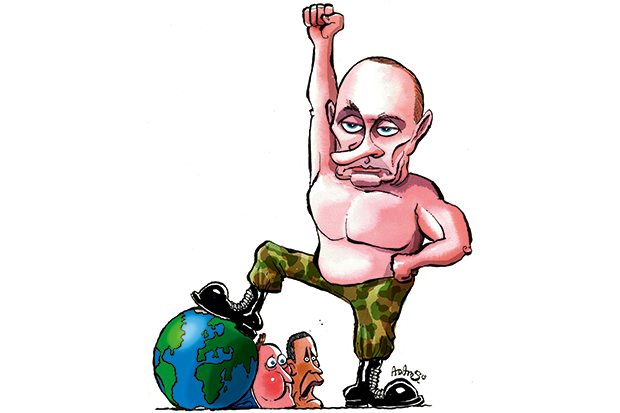
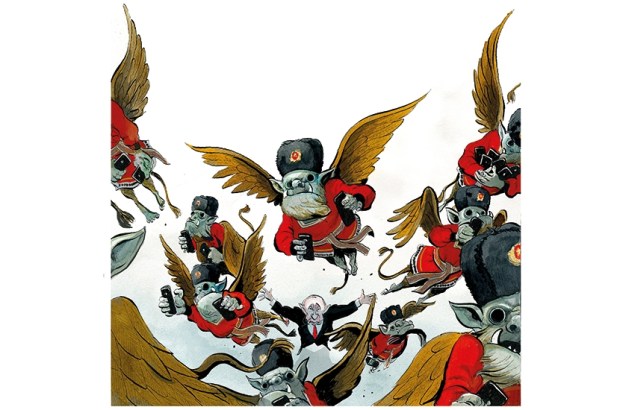
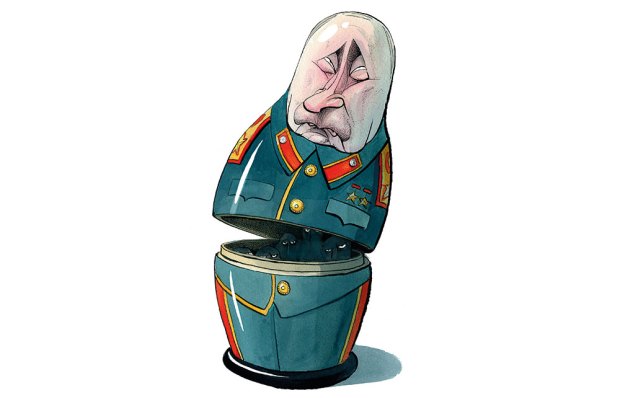
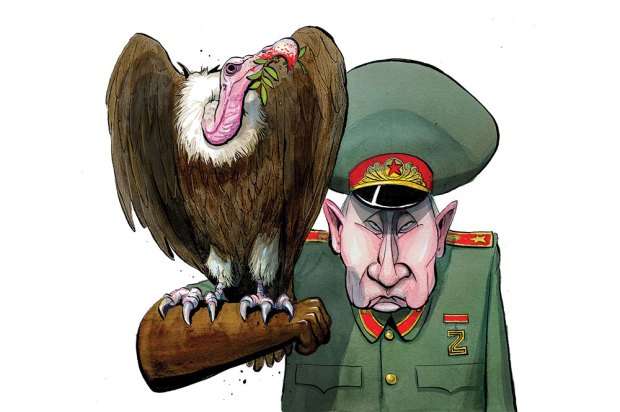
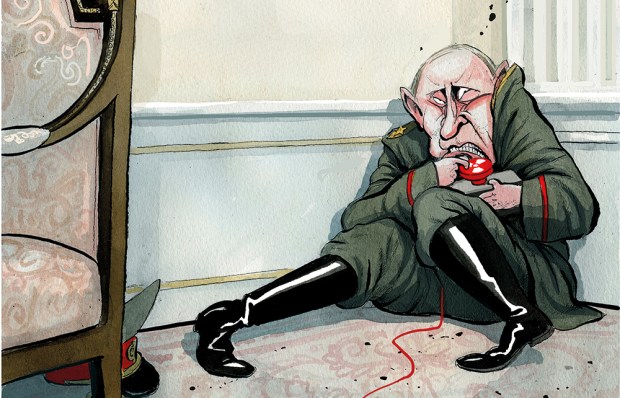








Comments
Don't miss out
Join the conversation with other Spectator Australia readers. Subscribe to leave a comment.
SUBSCRIBEAlready a subscriber? Log in